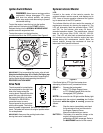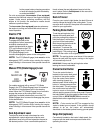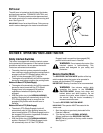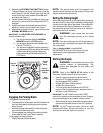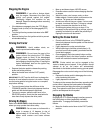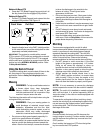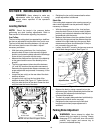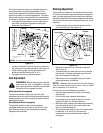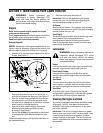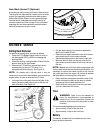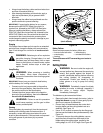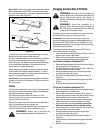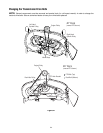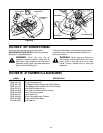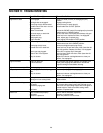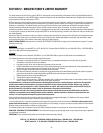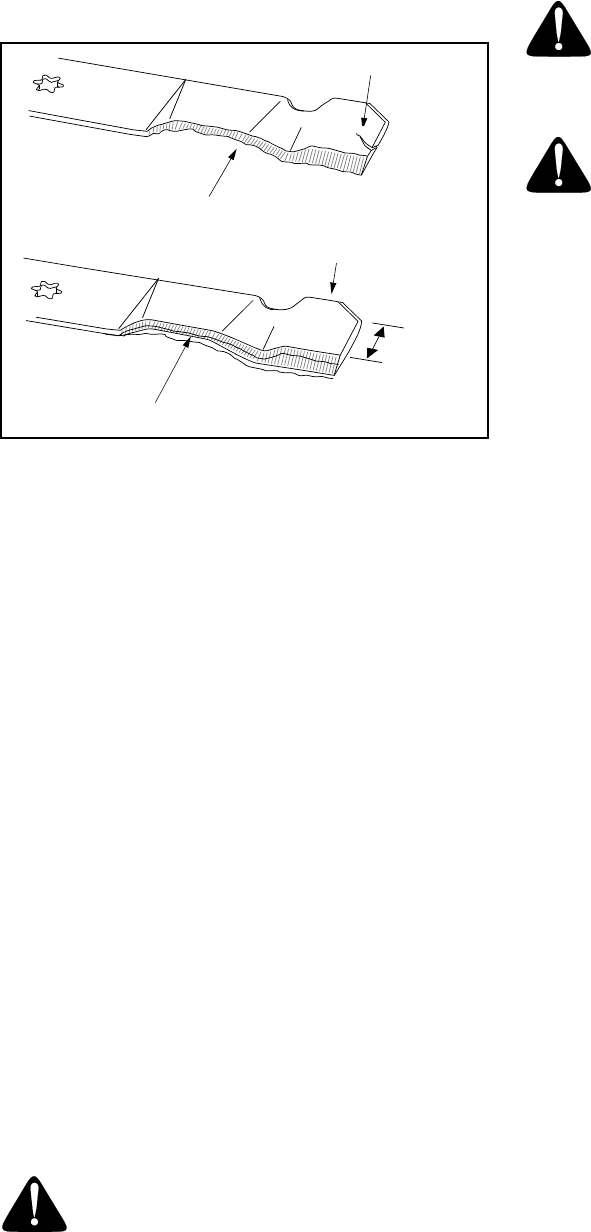
23
IMPORTANT:
If the cutting edge of the blade has already
been sharpened to within 5/8" of the wind wing radius,
or if any metal separation is present, replace the blades
with new ones. See Figure 20.
Figure 20
It is important that each cutting blade edge be ground
equally to maintain proper blade balance.
A poorly balanced blade will cause excessive vibration
and may cause damage to the tractor and result in
personal injury. The blade can be tested by balancing it
on a round shaft screwdriver. Grind metal from the
heavy side until it balances evenly.
When replacing the blade, be sure to install the blade
with the side of the blade marked ‘‘Bottom’’ (or with a
part number stamped in it) facing the ground when the
mower is in the operating position.
IMPORTANT: Use a torque wrench to tighten the blade
spindle hex flange nut to between 70 foot-pounds and
90 foot-pounds.
Fuses
Two fuses are installed in your tractor’s wiring harness
to protect the tractor’s electrical system from damage
caused by excessive amperage.
If the electrical system does not function, or your
tractor’s engine will not crank, first check to be certain
that the fuse has not blown.
One can be found under the hood mounted behind the
top of the dash panel on the support bar.
The other can be found under the seat mounted to the
inside of the tractor frame next to the battery tray.
WARNING: Always use a fuse with the
same amperage capacity for replacement.
Changing the Deck Belt & PTO Belt
WARNING: Be sure to shut the engine off,
remove ignition key, disconnect the spark plug
wire(s) and ground against the engine to
prevent unintended starting before removing
the belt(s).
WARNING: Avoid the possibility of a
pinching injury. Do not place your fingers on
the idler spring or between the belt and the
pulley while removing the belt.
All belts on your tractor are subject to wear and should
be replaced if any signs of wear are present.
IMPORTANT:The V-belts found on your tractor are
specially designed to engage and disengage safely. A
substitute (non-OEM) V-belt can be dangerous by not
disengaging completely. For a proper working machine,
use factory approved belts.
To change or replace the deck belt and PTO belt on
your tractor, proceed as follows:
• Lower the deck by moving the deck lift lever into the
bottom notch on the right fender.
• Remove the belt guards by removing the self-
tapping screws that fasten them to the deck.
42-inch and 46-inch Decks with Manual PTO
• Remove the belt keeper rod from around the engine
pulley (helpful but not essential).
• Carefully loosen, but do not remove, the screw and
nut securing the two idler pulleys.
• Remove the deck belt(s) from around all pulleys,
including the deck idler pulley.
• Route the new belts (deck belt first) as shown in
Figure 21.
• Tighten down the hardware securing the two idler
pulleys.
• Remount the belt guards removed earlier.
42-inch and 46-inch Decks with Electric PTO
• Remove the belt keeper rod from around the engine
pulley (helpful but not essential).
• Insert a 3/8”-drive ratchet wrench (set to loosen)
into the square hole found in the idler bracket on the
left side of the deck’s surface. See Figure 22.
• Grasp the ratchet’s handle and pivot it toward the
front of the tractor to relieve tension on the belt.
• With belt tension relieved, carefully remove the
belt from around the left-hand spindle pulley.
• Carefully loosen, but do not remove, the screw and
nut securing the two idler pulleys.
• Remove the deck belt from around all pulleys,
including the deck idler pulley.
• Route the new belts (deck belt first) as shown in
Figure 21.
• Tighten down the hardware securing the two idler
pulleys.
• Remount the belt guards removed earlier.
5
/
8
"
m
i
n
i
m
u
m
Worn Blade Edge
Wind Wing
Blade Separation
Sharpen Edge Evenly



